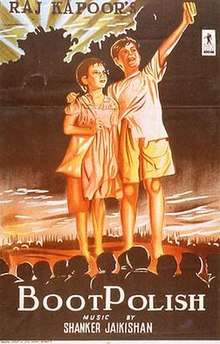Boot Polish (film)
Boot Polish (Hindi: बूट पॉलिश) is a 1954 Hindi film directed by Prakash Arora and produced by Raj Kapoor. It won Best Film at the Filmfare Awards[1].
| Boot Polish | |
|---|---|
 Film poster | |
| Directed by | Prakash Arora |
| Produced by | Raj Kapoor |
| Written by | Bhanu Pratap |
| Screenplay by | Bhanu Pratap |
| Story by | Bhanu Pratap |
| Starring | Kumari Naaz Ratan Kumar David |
| Music by | Shankar Jaikishan |
| Cinematography | Tara Dutt |
| Edited by | G. G. Mayekar |
Production company | |
| Distributed by | R. K. Films |
Release date | 1954 |
| Country | India |
| Language | Hindi |
Plot
Belu (Baby Naaz) and Bhola (Ratan Kumar) are left in the care of their wicked aunt Kamla, a prostitute, (Chand Burque) after their mother dies. She forces them to beg on the streets and takes the whole collection at night, often by beating them brutally.
A bootlegger and neighbour of Kamla, named John uncle (David Abraham) teach them self-respect and to work for a living instead of begging. Both kids start saving from their begging money by giving lesser paise to Kamla, so they can buy a shoe-polish kit and begin shining shoes. The dual manages to buy a shoe-polish kit and starts the business. But when Kamla discovers this, she beats them and kicks them out of the house.
Meanwhile, John discovers that Belu wants a new frock and Bhola needs a new shirt as their current rags are torn and worn out. Overwhelmed by the emotions to help Belu and Bhola, John Chacha decided to sell unauthorized liquor and gets arrested by the police. The children, on the other hand, are left to fend for themselves. When it rains, and people stop having their shoes polished, the children are in danger of starving. Bhola wishes never to beg again and rejects a coin tossed to him on a rainy night. When Belu takes it out of hunger, Bhola slaps her, and she drops it.
When the police come, intent on taking the children, Belu escapes onto a train, but Bhola is arrested. Onboard the train, Belu is adopted by a wealthy family, and she is sad for her brother.
Bhola searches for Belu after getting out of custody but cannot find her. After running away from an orphanage, he is unable to find work and extremely hungry and resorts to begging. He encounters Belu while begging at the railway station where Belu and her adopted family are boarding a train for vacation. Humiliated, Bhola runs away, but his sister pursues him. John Chacha has also come to the station to say goodbye and joins the chase, but he falls and is injured. Bhola stops running, and Belu and Bhola are reunited.
The wealthy family adopts Bhola also, and they live happily ever after.
Cast
- Narendra Rupani as Baby Boy (at start of Film)
- Kumari Naaz as Belu (as Baby Naaz) Kapoor visited 12 schools in Bombay in order to search for a suitable child actor.[2]
- Ratan Kumar as Bhola Bhandari
- David Abraham Cheulkar as John (as David)
- Chand Burke as Kamla Devi (as Chand Burque)
- Veera
- Bhupendra Kapoor
- Shailendra
- Mohanbali
- Nissar (as Master Nisar)
- Bhudo Advani as Pedro (as Budho Advani)
- Prabhu Arora
- Raj Kapoor as guy on bus/himself.
Awards

- Special Mention to a child actress - Naaz
- Filmfare Awards
- Best Cinematographer - Tara Dutt
- Best Film - Raj Kapoor
- Best Supporting Actor - David
Soundtrack
Lyrics written by Hasrat Jaipuri, Shailendra and Deepak.
| # | Song | Singer |
|---|---|---|
| 1 | Nanhe Munne Bachche | Mohammad Rafi, Asha Bhosle |
| 2 | Tumhare Hain, Tumse Daya Maangte Hain | Mohammad Rafi, Asha Bhosle |
| 3 | Chali Kaunse Des | Talat Mahmood, Asha Bhosle |
| 4 | Saari Duniya Hai Mujhpe Deewani | Asha Bhosle |
| 5 | Theher Zara O Jaanewale, Babu Mister Gore Kaale | Manna Dey, Madhubala Jhaveri, Asha Bhosle |
| 6 | Raat Gayi Phir Din | Manna Dey, Asha Bhosle |
| 7 | Lapak Jhapak Tu Aa Re Badarwa | Manna Dey |
| 8 | Tu Badhta Chal | Manna Dey |
References
- "Filmfare Flashback: Every movie that won the Filmfare Best Film Award from 1953 to 2017". filmfare.com. Retrieved 12 February 2020.
- "School Yields Star". Alton Evening Telegraph. 19 April 1954. p. 14. Retrieved 8 December 2014 – via Newspapers.com.

- "Festival de Cannes: Boot Polish". festival-cannes.com. Retrieved 31 January 2009.
External links
- Boot Polish on IMDb
- Boot Polish (1954) on YouTube